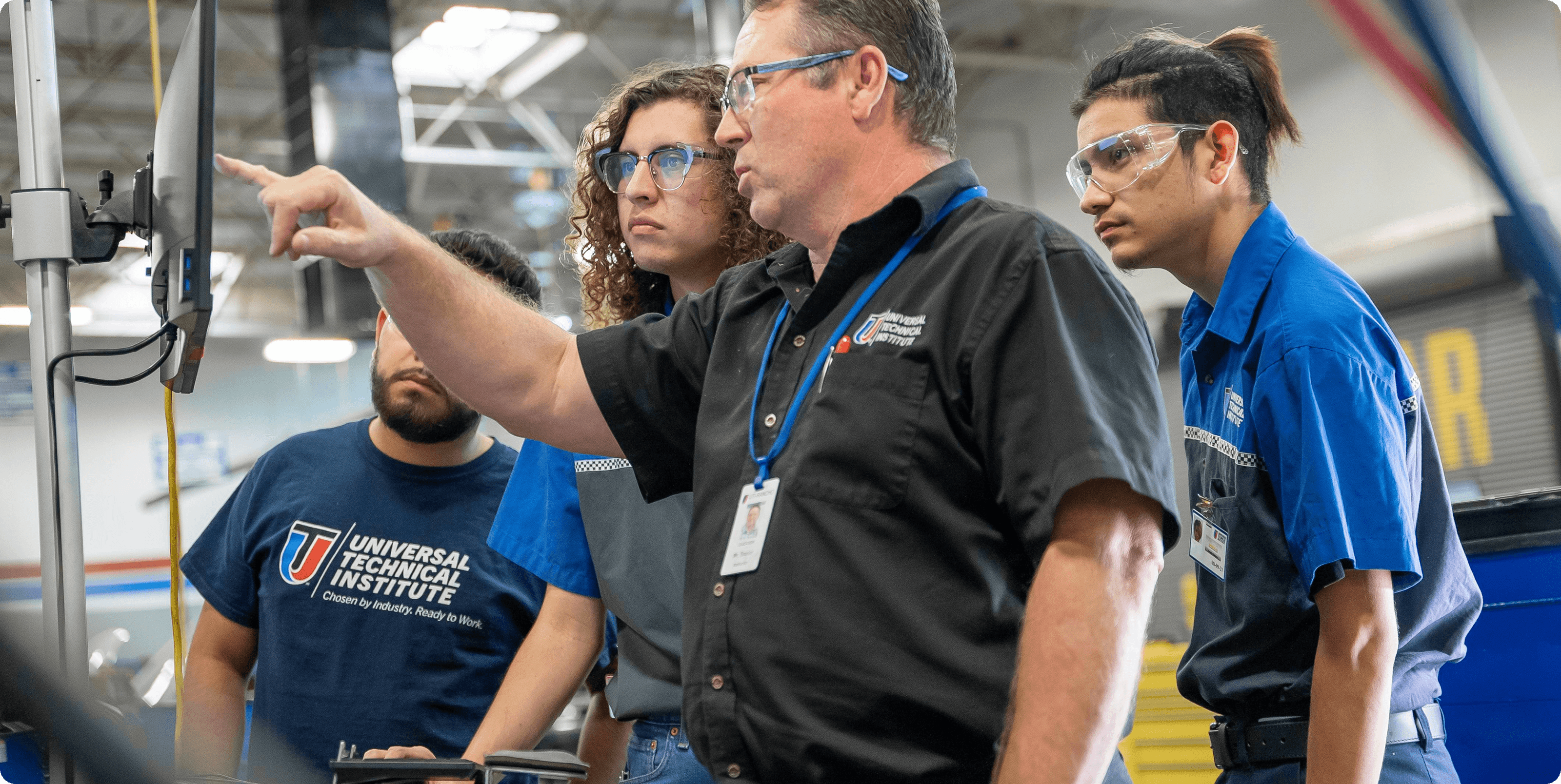- Home
- Financial Aid
UTI Financial Aid Options
Explore financial aid options you may qualify for so you can plan with confidence.10
Financial Aid Options Available
Paying for school doesn’t have to be complicated. Read about the available options you may qualify for below.

Scholarships & Grants
Need or merit-based awards that do not need to be repaid. In 2025, UTI awarded over $27 million in scholarships and grants, and applying for them is easier than you might think!10
Start Applying
Loans
Borrowed funds that can be repaid later to help cover tuition now. Fill out a Free Application for Federal Student Aid (FAFSA) to get started—our Financial Aid Advisors can help.
Get Help with FAFSA
Tuition Reimbursement
Tuition Reimbursement Incentive Programs vary by employer, but can include help repaying student loans, hiring incentive packages, tool purchase assistance or sign-on bonuses.14
Learn MoreMilitary and VA Education Benefits
Veterans, active-duty service members, and their families may qualify for VA education benefits, including the Post-9/11 GI Bill®, to help cover the cost of training at UTI.20,21
Explore Military Benefits
How To Apply for Financial Aid: Step-by-Step Guide
To determine your financial aid eligibility, you’ll need to complete a FAFSA. To do so, visit a UTI FAFSA Service Center or follow this step-by-step guide:
Create a StudentAid.gov Account
Visit studentaid.gov and create an account to establish a Federal Student Aid (FSA ID) - a username and password you set up to sign in to the U.S Department of Education's website and use their online tools.
Gather Necessary Documents
Collect your Social Security number, W-2s, tax returns, bank statements and any other financial records. If you're a dependent or married, you'll also need your parents' or spouse’s information.
Start the FAFSA Form
Log in to your studentaid.gov account and begin a new FAFSA application for the correct school year.
Complete the Student Demographics Section
Enter your personal information, such as your name, date of birth and address. Ensure all details match your official documents.
List Schools to Receive Your FAFSA Information
Add Universal Technical Institute as the school you're considering. Find our campus school codes here:
Find Our Federal School Codes HereSupply Financial Information
Enter your (and your parents' or spouse’s, if applicable) tax and income information. You can use the IRS Data Retrieval Tool to directly import tax data.
Sign and Submit Your FAFSA
After reviewing your information, sign the form using your FSA ID and submit it. Once submitted, you'll receive a Student Aid Report (SAR) summarizing your FAFSA information. Schools will use this to determine your financial aid eligibility.
Meet with a UTI Financial Aid Advisor
We can help explain your eligibility and provide tips on how to maximize your savings when applying for scholarships, grants or tuition reimbursement programs you may qualify for.
Completing the FAFSA is free and filling it out early can increase your chances of receiving aid so you can start training sooner.
“UTI was definitely the biggest one that wanted me to succeed”
“You see so many different ads for trade schools and all these different places you can go, but I think UTI was definitely the biggest one that wanted me to succeed and had all the resources to help me succeed.1”

Makenna Enga
UTI Grad
Frequently Asked Questions
Filling out the FAFSA is required to be considered for federal grants, scholarships, work-studies and student loans. Many schools and private scholarship programs also use FAFSA information to determine eligibility, so submitting it gives you the best chance to receive free money for school and other financial aid options.
Yes, many students complete a FAFSA before being accepted to their school of choice. Doing so helps them gauge their financial aid eligibility so they can plan with confidence.
If you don’t qualify for federal financial aid, you may still be eligible for scholarships, grants, employer-sponsored programs or flexible payment plans. Our Financial Aid Advisors can help you explore alternative options.
Ask a Financial Aid Advisor or find your campus below:
- UTI Austin: 016696
- UTI Avondale: 008221
- UTI Bloomfield: 016696
- UTI Canton: 013603
- UTI Dallas/Fort Worth: 016696
- UTI Exton: 016696
- UTI Houston: 016696
- UTI Lisle: 008221
- UTI Long Beach: 008221
- UTI Miramar: 008221
- UTI Orlando: 014518
- UTI Phoenix: 014518
- UTI Rancho Cucamonga: 008221
- UTI Sacramento: 014518
- UTI Mooresville: 008221
- UTI San Antonio: 016696
- UTI Atlanta: 014518
The Federal Pell Grant is a need-based financial aid program that provides funds to eligible students to help cover tuition and educational expenses. Unlike loans, Pell Grants do not have to be repaid.
Yes, you may still qualify for financial aid if you have a GED or meet specific Ability-to-Benefit (ATB) requirements. Contact our Financial Aid team to discuss your options.
The Save Key is a temporary password that allows you to save and return to your FAFSA application later. It’s useful if you need time to gather documents or share access with a parent or guardian
Still Need Help?
We’re here to make applying for financial aid simple.

Get More Information or Apply to UTI
Take the next step toward preparing for the future by selecting one of these options.

